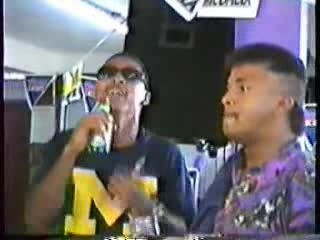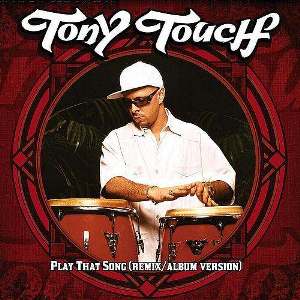Latin hip hop is hip hop music that is recorded by artists in the United States of Hispanic and Latino descent, along with Spanish-speaking countries in the Caribbean, North America, Central America, South America, and Spain.

Luis Armando Lozada Cruz, known by his stage name Vico C, is an American rapper, singer and record producer. Regarded as the founding father of reggaeton, Vico C has played an influential role in the development of Latin American hip hop and urban music.

The Music of Puerto Rico has evolved as a heterogeneous and dynamic product of diverse cultural resources. The most conspicuous musical sources of Puerto Rico have primarily included African, Taino Indigenous, and European influences. Puerto Rican music culture today comprises a wide and rich variety of genres, ranging from essentially native genres such as bomba, jíbaro, seis, danza, and plena to more recent hybrid genres such as salsa, Latin trap and reggaeton. Broadly conceived, the realm of "Puerto Rican music" should naturally comprise the music culture of the millions of people of Puerto Rican descent who have lived in the United States, especially in New York City. Their music, from salsa to the boleros of Rafael Hernández, cannot be separated from the music culture of Puerto Rico itself.

Reggaeton, also known as reggaetón or reguetón, is a modern style of popular and electronic music that originated in Panamá during the late 1980s, and which rose to prominence in the late 1990s and early 2000s through a plethora of Puerto Rican musicians. It has been popularized and dominated by artists from Puerto Rico since the early 1990s.

Tegui Calderón Rosario is a Puerto Rican rapper, singer and actor. He began his musical career in 1996 and was supported by the famous Puerto Rican rapper Eddie Dee, who invited him on his second studio album, El Terrorista de la Lírica, released in 2000. Calderón reached international success in 2003 with his first album, El Abayarde, which sold 300,000 copies worldwide and was nominated for a Latin Grammy Award. His importance in reggaeton music led him to participate in Eddie Dee's 12 Discípulos album in 2004. He released three more studio albums between 2006 and 2015, varying in styles, focusing more in hip hop and African music rather than reggaeton in The Underdog/El Subestimado (2006) and El Abayarde Contraataca (2007). His fourth studio album, El Que Sabe, Sabe, released in 2015, won a Latin Grammy Award for Best Urban Music Album. In the same year, he announced that he is planning a studio album alongside the Puerto Rican singer Yandel titled El Blanco y el Negro.

The Nuyorican movement is a cultural and intellectual movement involving poets, writers, musicians and artists who are Puerto Rican or of Puerto Rican descent, who live in or near New York City, and either call themselves or are known as Nuyoricans. It originated in the late 1960s and early 1970s in neighborhoods such as Loisaida, East Harlem, Williamsburg, and the South Bronx as a means to validate Puerto Rican experience in the United States, particularly for poor and working-class people who suffered from marginalization, ostracism, and discrimination.

El Abayarde is the debut studio album by the Puerto Rican rapper Tego Calderón. It included the singles "Pa' Que Retozen", "Guasa Guasa" and "Al Natural". It was released in 2002 through White Lion Records selling over 50,000 copies its first week between Puerto Rico and some parts of the United States. It would eventually be internationally distributed by Sony BMG in 2003. The album sold 132,000 copies in the US and more than 350,000 copies worldwide. El Abayarde was nominated for a Lo Nuestro Award for Urban Album of the Year and Best Rap/Hip Hop Album in the 4th Latin Grammy Awards in 2003.
Bachatón is a fusion genre of reggaeton from Panama and Puerto Rico as well as bachata from the Dominican Republic. Bachaton combines bachata melodies and reggaeton style beats, lyrics, rapping, and disc jockeying. The word "bachatón" is a portmanteau of "bachata" and "reggaeton". "Bachatón" was coined and widely accepted in 2005. It is a subgenre of reggaeton and bachata.

"Play That Song" is a song by Puerto Rican-American rapper and record producer Tony Touch from his debut Spanish-language reggaetón album and fourth overall studio album The ReggaeTony Album (2005). It features guest vocals from Puerto Rican-American female duo Nina Sky and American rapper B-Real. The track was written by Natalie Albino, Nicole Albino, Vladimir Felix, Louis Freeze, Stephen Hague, Joseph Hernandez, Malcolm McLaren, Ronald Larkins, Robert Andrews and Tyrone Price. It was released digitally on September 25, 2005 as the lead single from the album, preceding "Saca La Semilla" with Ivy Queen and Gran Omar.

The Nuyorican Poets Cafe is a nonprofit organization in the Alphabet City neighborhood of Manhattan in New York City. It is a bastion of the Nuyorican art movement, and has become a forum for poetry, music, hip hop, video, visual arts, comedy, and theater. Several events during the PEN World Voices festival are hosted at the cafe.
White Lion Records is a reggaeton, Latin Music, Latín reggae and urbano record label established by Elías de León with the release of the album No Mercy by Daddy Yankee in 1995. The label would temporarily change its name to 'Boricua Guerrero' from 1996-2001 until reestablishing as White Lion Records with the releases of Maicol y Manuel's "Como En Los Tiempos De Antes" and the compilation "Planet Reggae" in 2002. As an independent label in 2003, it was selling over 100,000 copies of Tego Calderon's most recent album at the time; it soon after signed a distribution deal with Sony BMG.

David Sánchez Badillo, known professionally as Tempo, is a Puerto Rican rapper and songwriter. He was the leading figure in the reggaeton scene from the late 1990s until his arrest in 2002. He was released in 2013 after spending 11 years in prison. Although Tempo had success during the emergence of reggaeton, his popularity faded following his imprisonment; he is nowadays regarded as a controversial figure within the genre.
Big Boy is a Puerto Rican reggaeton rapper. He is considered one of the founding fathers of reggaeton in Puerto Rico. He is known for his worldwide success in the 1990s, with songs such as "Mis Ojos Lloran Por Ti", "Maria", "He Chocado Con La Vida", "Que Vayas Con Dios" and "Mi Chica De La Voz Sensual". His album "The Phenomenon" was nominated for the 2003 Latin Grammy Awards for Best Rap/Hip-Hop Album and for the Premios Lo Nuestro 2003 for Urban Album of the Year and Best Urban Performance. His song "Mis Ojos Lloran Por Ti" peaked at 18 in Top Latin Songs.
Latin trap is a subgenre of Latin hip hop music that originated in Puerto Rico. A direct descendant of southern hip hop, and influenced by reggaeton, it gained popularity after 2007, and has since spread throughout Latin America. The trap is slang for a place where drugs are sold. Latin trap is similar to mainstream trap with lyrics about life on la calle, drugs, sex and violence.
Urbano music or Latin urban is a transnational umbrella category including many different genres and styles. As an umbrella term it includes a wide and diverse set of genres and styles such as dancehall, dembow, urban champeta, funk carioca, Latin hip hop and reggaeton. The commercial breakthrough of this music took place in 2017 with artists from Colombia, Cuba, the Dominican Republic, Panama, Puerto Rico, the United States, Venezuela and even non-Spanish-speaking nations, such as Brazil, where Portuguese is spoken.








